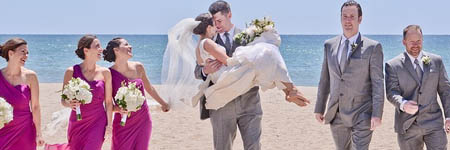The History of Wedding Traditions
Weddings have been influenced by different cultures, history and religion for centuries, to create varying traditions in each culture. Until the nineteenth century, weddings were less about love than the security the groom's family would provide to the family of the bride when the couple married. In most cases brides were chosen according to their economic worth, with the groom or bride being given a dowry to establish a new house.
Today, most wedding ceremonies involve special wedding clothes and an exchange of marriage vows by the couple within a ceremony that incorporates music, poetry, prayers or readings from religious texts or texts that have meaning to the couple getting married. Wedding traditions across many cultures also include the presentation of a gift and a public proclamation of marriage by an authority figure.


The Wedding
Wedding Attire

The best man
The Bachelor Party
Giving Away The Bride
The Bouquet
About JA
Each one of us has a vision of the perfect event. Jessie will make sure your vision becomes a reality and plan the event to your heart's desire.

Contact Details
Email: contact@jessieabrams.com
The right planning expert for: organization of the Wedding celebrations, birthday parties, company parties, anniversaries and more.
Join The Wedding Community
©Copyright 2016 JA The Wedding Planner
